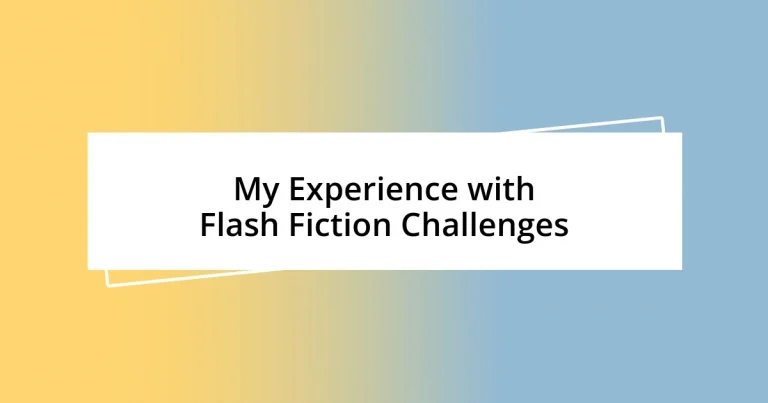Key takeaways:
- Flash fiction challenges enhance creativity by requiring brevity, prompting writers to focus on core themes and character development.
- Participating in these challenges fosters a sense of community, providing opportunities for feedback and collaboration that enrich storytelling skills.
- Effective writing involves preparation, vulnerability, and thorough revision, allowing writers to connect with their audience and refine their work for maximum impact.
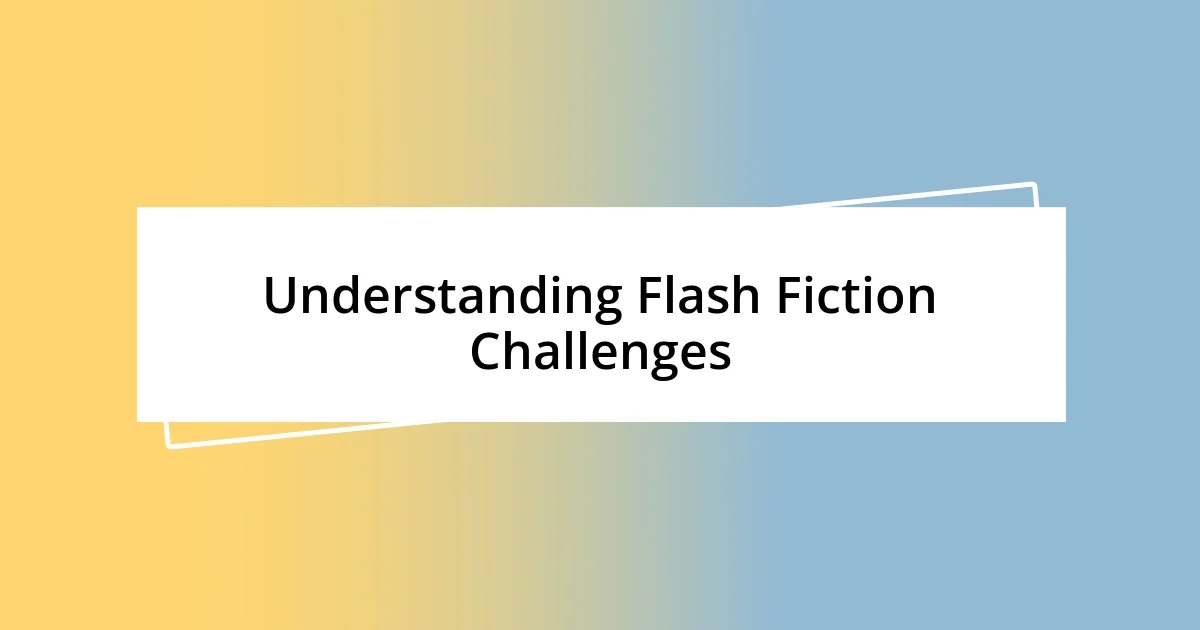
Understanding Flash Fiction Challenges
Flash fiction challenges can seem daunting at first, but they’re an exciting way to stretch your creativity. I remember my first challenge; I felt the pressure of capturing an entire story in just 100 words. It was a rollercoaster of emotions—thrilling yet nerve-wracking—because how do you convey deep themes and character development in such a tight space?
One aspect that intrigues me is how these challenges force you to focus on brevity. Every word counts, and I’ve often found myself editing and re-editing, searching for just the right phrase that packs a punch. Have you ever felt a sense of liberation in limitations? It’s fascinating how constraints can actually fuel creativity, allowing you to hone in on the core of your story.
After participating in several challenges, I realized they’re not just exercises in brevity but also opportunities for experimentation. Each prompt invites you to dig deeper into different genres or styles, pushing the boundaries of your comfort zone. I’ve written pieces that surprised even me, and there’s a unique satisfaction in exploring new storytelling facets; it’s like uncovering hidden layers of your own writing voice.
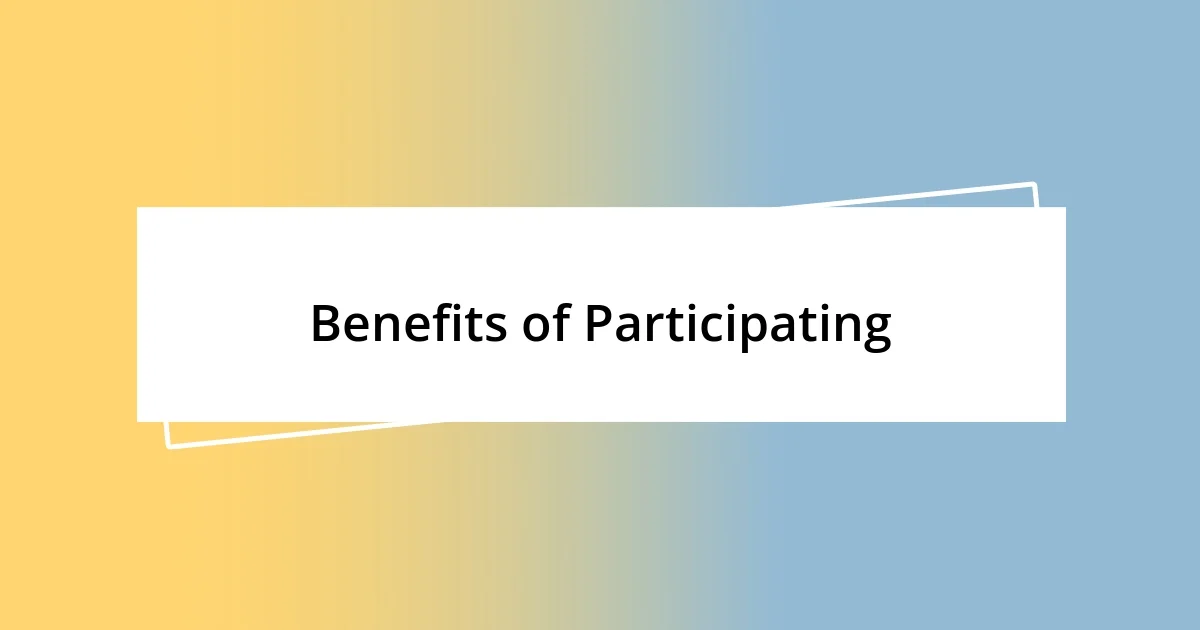
Benefits of Participating
Participating in flash fiction challenges has significantly improved my storytelling skills. Each time I dive into a new prompt, I find myself grappling with the essence of my ideas and experimenting with new perspectives. For instance, one of my recent entries revolved around a mundane object—a simple spoon. It forced me to see it through a unique lens, and I was amazed at how much depth could be unearthed from such ordinariness.
Another benefit I cherish is the sense of community that these challenges foster. When I first joined an online group dedicated to flash fiction, I was welcomed with enthusiasm and encouragement from fellow writers. Sharing my work and receiving feedback was a game changer. It not only boosted my confidence but also introduced me to diverse writing styles and voices that enriched my own. Have you ever felt that spark of inspiration from someone else’s words? I certainly have, and it’s a powerful experience.
Moreover, these challenges have sharpened my ability to think on my feet. In one challenge, we had just 30 minutes to write a story based on a random selection of words. The adrenaline was exhilarating! Learning to embrace spontaneity has helped me in both my writing and life; I now look for stories everywhere, savoring fleeting moments as potential narratives waiting to unfold.
| Benefit | Description |
|---|---|
| Improved Writing Skills | Enhances storytelling abilities through brevity and creativity. |
| Sense of Community | Encourages sharing and feedback among diverse writers. |
| Enhanced Creativity | Prompts spontaneous writing, fueling ideas and inspiration. |
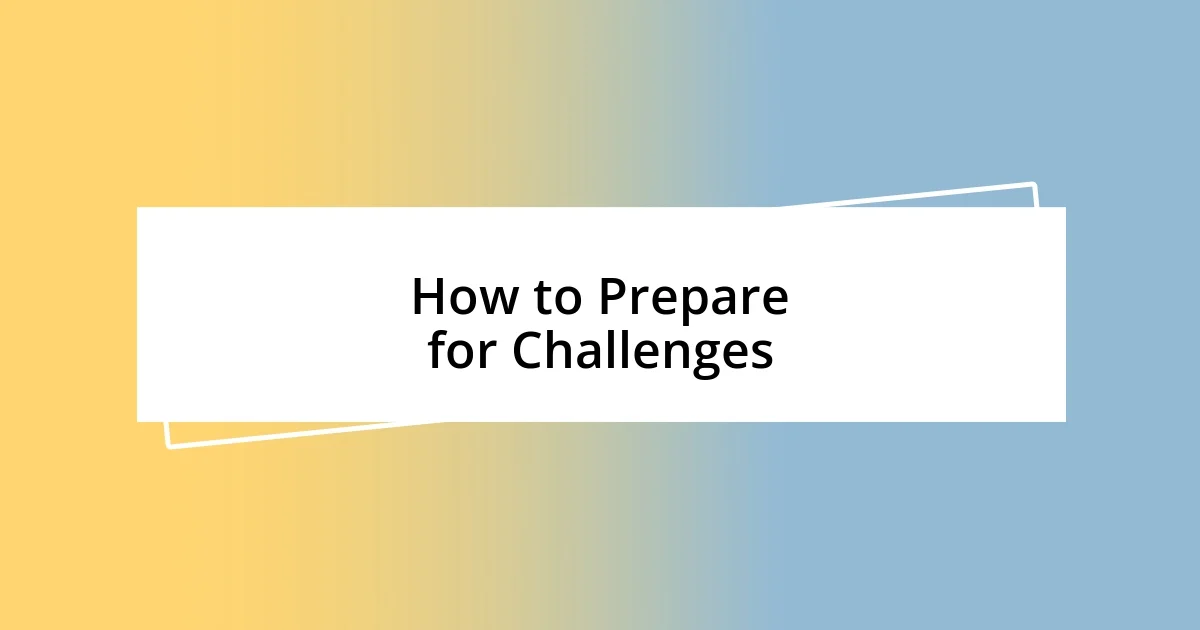
How to Prepare for Challenges
Preparing for flash fiction challenges requires a blend of mental readiness and practical strategies. Personally, I always start by immersing myself in different themes and styles. For instance, when a prompt focusing on dystopia came my way, I spent a few evenings reading classic dystopian literature and watching films. This research not only solidified my understanding of the genre but also ignited a fire of inspiration. The night before the deadline, I felt a mix of excitement and anxiety, knowing that I was well-prepared to unleash my ideas onto the page.
Here’s how you can enhance your own preparations for flash fiction challenges:
- Read Widely: Dive into various genres to expand your creative horizons.
- Jot Down Ideas: Keep a notebook handy for spontaneous inspirations or snippets of dialogue.
- Practice Timed Writing: Set a timer and write short stories under pressure to simulate the challenge.
- Engage with the Community: Discuss prompts and ideas with fellow writers to gain fresh perspectives.
- Reflect on Past Entries: Analyze your earlier submissions to identify strengths and areas for improvement.
By blending research with practical exercises, I found that my confidence blossomed, and the thrill of creating became less daunting and more exhilarating. Ultimately, the challenge is as much about preparation as it is about execution, and that makes all the difference.

Developing Unique Story Ideas
When it comes to developing unique story ideas, I often turn to my surroundings for inspiration. One day, while sipping coffee at a bustling cafe, I noticed a couple having a seemingly mundane conversation. But rather than seeing it as just small talk, I imagined it could be the last conversation they ever had. This twist pushed me to think differently and realize that unique stories often lie beneath the surface of everyday life. Have you ever paused to listen to the stories playing out around you? It’s a treasure trove of ideas waiting to be unearthed.
Another technique I find valuable is the ‘what if’ game. By asking myself questions like, “What if a cat could talk?” or “What if someone found a hidden door in their home?” I’m able to cultivate a fertile ground for creativity. One time, this playful exercise led me to a tale about a janitor who, after discovering an ancient mirror, began to see the souls of those who passed by. That simple prompt transformed into something much deeper and darker than I originally intended. This approach not only sparks my imagination but also encourages me to explore themes like identity and connection.
I also believe that collaborating with other writers can deepen the creative process. Last month, I joined a group brainstorming session where we built on each other’s concepts. One person’s quirky character idea inspired me to craft a flash fiction piece that blended humor with a poignant ending. Collaboration challenges my perspective and enhances my creativity. How often do you collaborate with others in your writing journey? I’ve found that sharing ideas creates an infectious energy that reshapes and refines my work in the most unexpected ways.
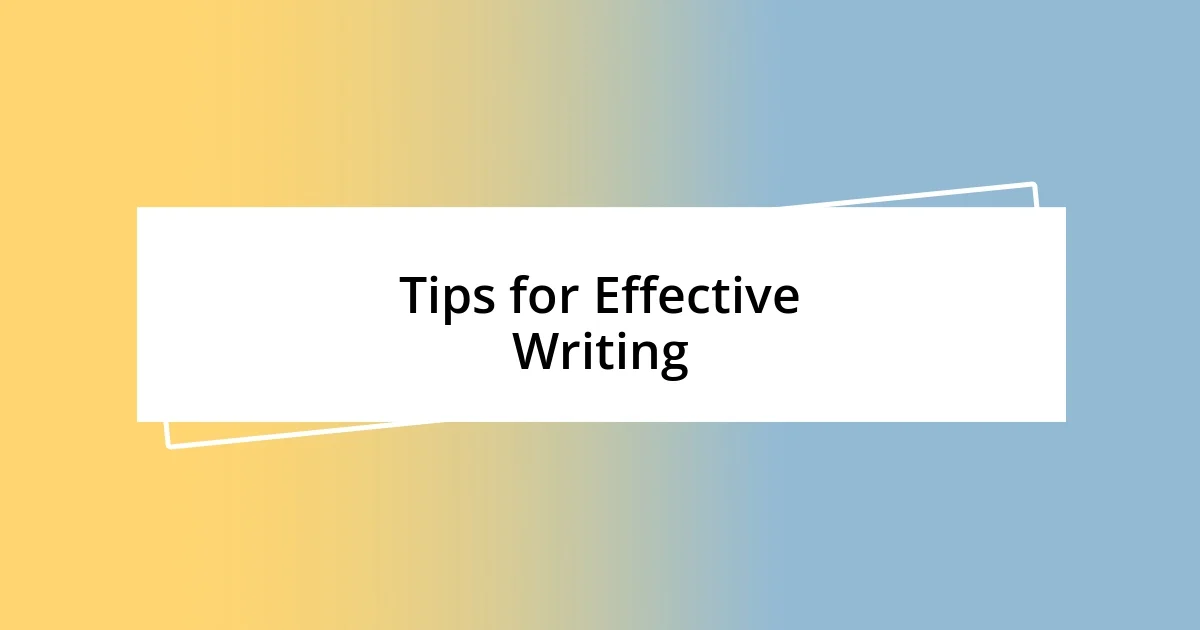
Tips for Effective Writing
When it comes to effective writing, one tip I can’t stress enough is to embrace brevity. Flash fiction demands precision, so every word must pull its weight. I remember a piece I crafted where I had to cut down my initial draft by half. It was challenging, but it forced me to focus on the core of my story, distilling it to its essence. I found that this process not only improved clarity but also deepened the emotional impact, making my readers feel more engaged. Have you ever tried trimming down your own writing? You might be surprised at the depth you can reveal by removing the unnecessary.
Another crucial aspect of effective writing is the significance of sound and rhythm. When I read my pieces aloud, I often catch awkward phrasing or clunky transitions I might miss on the page. The first time I did this, I stumbled over a sentence that felt fine in silence but fell flat when spoken. It was an eye-opener, helping me learn that how something reads is just as important as what it says. I encourage you to give it a try. Do you find your work flows smoothly when you hear it spoken? You might just discover new layers to your writing.
Finally, don’t hesitate to be vulnerable in your storytelling. I often weave personal experiences into my flash fiction, allowing my readers a glimpse into my world. There was a time I shared a story about loss, inspired by my grandmother’s passing. It was difficult, but responding emotionally allowed me to connect with my audience on a meaningful level. Have you considered tapping into your own emotions? Authenticity resonates profoundly, often creating an unspoken bond between you and your readers. Embrace your feelings and let them guide your words.

Revising and Polishing Your Work
Revising and polishing your work can feel like an art form in itself. I remember the first flash fiction piece I submitted to a contest; I thought I was done after the initial draft. However, when I revisited it a week later, I spotted phrases that no longer resonated and characters who needed more depth. That moment taught me the importance of stepping back for a fresh perspective. Have you ever been surprised by what you discover in your own writing upon revisiting it?
I find that reading my work aloud is a game changer during the revision process. One day, I was working on a piece and decided to voice it out for a friend. As I spoke, I stumbled over a line that felt great on paper but awkward out loud. This experience opened my eyes to how our writing can take on a life of its own when given the chance to breathe through our voices. There’s a rhythm to our words that requires attention. Why not give it a try with your own narratives?
Detailing and refining your characters is another essential step. I once had a character whose motivations were cloudy at best. After some reflection, I began to add layers—small backstories, quirky habits, and even dialogue quirks. Suddenly, he transformed into someone rich and relatable, not just a placeholder in my plot. Have you ever fleshed out a supporting character only to find that they become the heart of your story? The more you dig into these details, the more authentic and engaging your work becomes.

Sharing Your Stories with Others
Sharing my stories with others has been one of the most rewarding aspects of my writing journey. I remember the first time I read a piece aloud at a local writer’s group. My heart raced as I shared a story about an encounter that deeply moved me. To my surprise, my vulnerability resonated with the audience, sparking discussions that made me realize the power of connection through storytelling. Have you ever felt that rush when you shared a piece of yourself with someone else?
Engaging with readers can also lead to invaluable feedback and growth. There was a moment when I posted a flash fiction piece online and received a comment that shifted my perspective entirely. A reader pointed out a subtle theme I hadn’t even considered, illuminating the story in a whole new light. It reminded me that sharing isn’t just about putting my work out there; it’s about opening a dialogue. Have you thought about what insights your audiences might offer if you let them in?
Furthermore, sharing stories often encourages others to share theirs, creating a beautiful ripple effect. I recall a writer friend who, inspired by my story of resilience, opened up about their own struggles. This exchange deepened our friendship and fostered a supportive community among us. Isn’t it fascinating how your words can spark someone else’s voice? Embracing this creates a unique tapestry of shared experiences that enriches us all.












